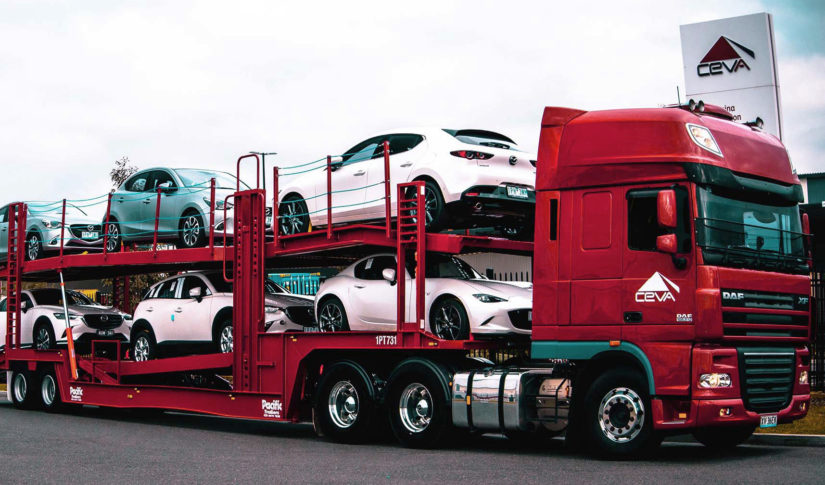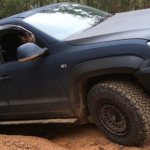Enclosed auto transport offers specialized shipping for valuable and rare vehicles. This premium service transports cars, trucks, SUVs, and other automobiles in covered trailers safeguarded from road hazards and inclement weather. Suppose you’re considering enclosed transport for a luxury, classic, custom, or collector vehicle. This guide will help you understand the benefits, choose a qualified company, prepare your vehicle, and know what to expect for costs.
What is Enclosed Auto Transport?
Enclosed car transport protects vehicles inside covered truck trailers. Unlike standard open carriers that expose cars to the elements, enclosed transport fully seals the trailer. This prevents damage from rain, snow, debris, and other road hazards that might mar exterior paint and finishings.
Enclosed trailers come in different configurations with features like temperature control, custom interior braces, and hydraulic lift gates. Some have double-decker or side-loading options to transport multiple vehicles in one haul. Most experts recommend enclosed transport for added safety and security when shipping higher-value classic, vintage, or exotic vehicles.
Types Of Enclosed Transport Carriers
The main options for enclosed vehicle shipping include small hotshot carriers for 1-3 cars, sizeable dual-level stack trailers moving 4-6 vehicles, oversized trailers for tall/wide vehicles, and soft-sided carriers with weather protection.
Hotshot Enclosed Car Haulers
Hotshot enclosed trailers focus on carefully transporting 1-3 vehicles in a simple single-deck layout. With all cars on one level, drivers can give white-glove attention to each rare classic or luxury vehicle during loading/unloading. Interiors feature vehicle-specific tie-downs, floor padding, and often climate control. Hotshot enclosed shipping works well for owners or collectors transporting small collections across town or cross-country.
6-Car Enclosed Auto Transport Rigs
The most common enclosed carriers are large, dual-deck trailers hauling 4-6 vehicles stacked on two levels. The lower level loads drive-on style via ramp before an integrated lift raises the remaining vehicles to the sealed second story. Large fleet transfers use stacked configurations to efficiently relocate inventory despite confined vertical space. Walls lock securely, and some offer GPS cargo tracking. Where volume matters most, stack transport enclosed units lead the industry.
Oversized Priceless Vehicle Enclosures
Oversized trailers provide ultimate clearance and protection for owners transporting exceptionally tall or wide-prized vehicles like vintage motorhomes, luxury yachts, and limos. These custom enclosures can handle extended lengths over 70 feet with 12-15 foot interior height, allowing vehicles most standard enclosures cannot accommodate. Features cater to extensive vehicle handling like auxiliary lighting, accessory power, and specialized tie-downs. Maximizing care for a one-of-a-kind oversized vehicle demands an equally oversized enclosed solution.
Soft-Sided Weather Barrier Trailers
Some carriers offer alternatives like soft-sided trailers secured via straps for added protection from road elements without complete enclosures. These covered carriers shelter vehicles from UV rays, rain/snow, and falling debris that might damage exteriors. Ventilation proves better for cross-country trips as well. They function as a midpoint option balancing protection and open exposure.
The optimal choice comes from vehicle types, risk factors, fleet numbers, and desired features like climate control. With enclosed shipping, clients gain options paralleling services from standard hotshot transplanting your household sedan to presenting a priceless concept car at the world’s most discerning events.
Key Benefits of Enclosed Auto Transport
Suppose you’re preparing to relocate vehicles to a new home across the country or have finally found your dream classic car requiring specialist transport. In that case, you’ll need to weigh open versus enclosed auto shipping options. Both securely transport cars and trucks great distances, but enclosed carriers offer key benefits vital for prized possessions.
1. Reduced Exposure to Road Elements
Unlike open car haulers that leave vehicles fully exposed on both levels, enclosed auto transport protects your ride from the elements inside hard-sided semi-truck containers. Your vehicle stays protected across all weather conditions, blocking precipitation that could water-spot paint or pool on leather seats. No messy cleanup hassling perfectionists!
2. Extra Care with Handling
Specialty ramps and lifts facilitate smooth single-vehicle loading into enclosed trailers without needing crowded drive-on access like open carriers. Softer walls and interior padding shield against scrapes from accidental bumps in transit. It’s about keeping flawless condition from start to finish.
3. Enhanced Security
Exotic cars can attract unwanted attention, making them targets for vandalism or theft. Enclosed shipping offers lockable, hard-sided defenses with customized access controls. Private vehicles in sealed containers draw less notice while in transit or temporarily parked. This enhances security and discretion.
GPS tracking and road monitoring further improve protections, allowing owners (or insurance companies) to audit transport conditions after delivery.
4. Protection from Environment & Road Hazards
Delicate surfaces and complex components on rare, luxury, and vintage vehicles need specialized handling and protection. Enclosed shipping shields them from road debris that could chip paint or scratch body panels. Internal braces keep the vehicle stable, while padded walls prevent exterior damage in transit.
Temperature-controlled trailers also maintain ideal interior conditions for leather, wood, chrome, and other materials vulnerable to warping or drying out. This level of protection exceeds what’s possible on uncovered open carriers.
5. Specialist Handlers Trained For Exotics
Unlike open shipping, which relies on truckers of varying skill, drivers for premier enclosed carriers undergo advanced instruction tailored to expensive vehicles needing white glove handling. Knowing my irreplaceable Mustang rides comfortably with VIP treatment befitting its survivor heritage is essential.
6. Privacy & Discretion
For celebrity clients or high-net-worth owners shipping rare luxury vehicles to events, discretion matters. Enclosed shipping provides privacy that open auto transport lacks, keeping your vehicle and travel plans hidden while in transit.
Custom trailers with one-way mirrored window tinting allow the cargo area to function similarly to limousine privacy partitions. This keeps valuable assets out of sight while allowing drivers to monitor conditions from the cabin during transport.
How to Choose an Enclosed Auto Transport Service
Transporting your rare classic car or prized SUV across the country brings justified nervousness. You want reassurance that your baby will ride securely among strangers for thousands of miles. Follow these key steps when researching providers to ease worries.
#1 – Scan Transporter Reviews Extensively
Consumer sites like BBB and TransportReviews offer candid insights into past clients’ experiences. Check for damage claims, timeliness ratings, and specialty experience with classics or luxury vehicles. It builds trust, seeing 5-star satisfaction scores firsthand from other owners.
#2 – Verify Licensed Operating Authority
Reputable enclosed carriers should hold active operating authority with the Federal Motor Carrier Safety Administration (FMCSA). This proves standing with transportation regulators after submitting required insurance, training documentation, and safety records for review. It’s the first step in validating legitimacy.
#3 – Inquire on Custom Equipment and Drivers
Ask candidates about the types of enclosed trailers used – purpose-built hotshot carriers or mass-market stack units. Are lift gates, air-ride suspension, interior padding, and specialty ramps standard for delicate vehicles? Equally important, what specialized classic car handling training and vetting ensures drivers secure and respect your pride and joy? White glove service requires investment in gear AND expert caretaking.
#4 – Confirm Contingency Support Resourcing
Unforeseen road incidents can happen across thousand-plus-mile journeys. Ask what contingency assistance the transporter can provide if weather or mechanical delays occur en route. Can they reroute your vehicle to protected terminal parking rather than expose it on roadsides? Make sure support infrastructure exists for the long haul.
#5 – Verify Strict Certifications and Memberships
Industry associations like the Registered Auto Transporter Alliance (RATA) enforce rigorous quality standards and conduct background checks on owners/drivers for properly licensed enclosed carriers. This strict vetting validates responsible auto transporters committed to safety, training, and specialized equipment for rare vehicle transport needs.
#6 – Review Insurance Policies Carefully
With enclosed shipping costing substantially more than standard open transport, ensure providers carry premium cargo insurance and bonded policies commensurate with high-value vehicles in case of accident or errors. Ask for coverage details in writing before departure. Securing customer satisfaction matters when you place irreplaceable cars in their hands.
#7 – Request References From Past Exotic & Classic Owners
Any transporter can tout promises marketing luxury care. But take the extra step to request contact info for previous clients shipping similar high-end classic cars, muscle vehicles, or vintage boats. Speaking directly with other owners who entrusted their baby’s care provides priceless insights before you hire.
Questions to Ask
- Are driver’s background checks with training specific for high-value vehicles?
- Can they provide references from other exotic/classic car owners?
- What access will I have to monitor shipment status?
- How are potential delays or issues communicated?
- Do they specialize exclusively in enclosed shipping?
Takeaway
Vetting providers thoroughly minimize risks when trusting your rare vehicles to unknown transport operators. Once you identify reputable carriers with verifiable experience shipping similar high-value cars, request insurance certificates and monitor access during transport.
Preparing Your Vehicle for Enclosed Transport
Proper preparation before enclosed shipping ensures your vehicle arrives safely at its destination. Follow this checklist to get your vehicle ready for loading:
- Check battery & fluid levels (battery may drain in transit)
- Adjust tire pressure to the recommended PSI
- Disable alarms (open trailer can trigger sensors)
- Check for fluid leaks underneath
- Ensure the parking brake is disengaged
- Fill the gas tank 1/4 full to prevent evaporation
- Disconnect toll pass transponders (avoid charges)
- Remove antennae or other removable exterior accessories
Some owners use a shipping cover – a fitted breathable layer providing 360-degree protection from incidental surface scratches during loading and transport.
Remember to detail any pre-existing cosmetic flaws like parking lot chips that could be mistaken for new damage from transit. Always document condition thoroughly at origin and destination with dated photographs and written records.
Cost Factors in Enclosed Auto Transport
Enclosed shipping costs more than standard open transport but offers commensurate benefits for valuable classic and exotic vehicles requiring specialized security and handling. Expect pricing in the $2.00 – $4.00 per mile for enclosed services. The exact rate depends on:
Distance & Route: Cost scales with mileage due to fuel, tolls, and driver time. Cross-country routes or tricky urban maneuvers increase effort and raise the price.
Seasons & Timing: Peak demand during snowbird season for snowbirds relocating luxury vehicles to/from winter climates increases costs as availability tightens.
Special Handling: Multi-car transport, oversized pieces like limos requiring special permits, or residential delivery involving smaller trucks arranged by appointment can add fees.
Insurance: Insuring rare vehicle transport for substantial declared values requires increased premiums, which take the form of higher pricing passed to owners.
Compared to essential open transport in the $1.00 – $1.50 per mile range, enclosed protects against tens of thousands in potential damage at a relatively modest additional cost – inexpensive peace of mind when shipping prized vehicles.
Enclosed Auto Transport for Luxury and Classic Cars
Enclosed auto transport brings peace of mind to collectors, restorers, and motorsport enthusiasts sharing a passion for critical rare vehicles. Without the distraction of monitoring risks in transit, owners can focus on perfecting every bespoke detail in their ongoing pursuit of automotive excellence.
- Climate Control: Maintaining optimal temperature and humidity prevents damage to sensitive leather, wood, chrome, and other materials inside luxury vehicle cabins during transport.
- Enhanced Security: The hardened, locked containment of enclosures provides additional anti-theft protections for rare vehicles that may attract more criminal attention on open carriers.
- Custom Crating: Certain extremely high-value vintage cars may warrant custom wooden crates with integrated tie-downs, impact cushioning, and dust barriers for international shipping of fine art pieces or exotic equipment.
- White Glove Handling: Concierge loading assistance and enclosed trailers with specialty lift gates facilitate residential pickup, catering to vehicles unable to clear steep ramp inclines on standard auto transport rigs.
- Expedited Transport: Quick point-to-point single-car enclosed transport minimizes stops and frees drivers to prioritize careful handling for each prized vehicle move.
- Real-Time Monitoring: GPS vehicle tracking apps provide owners with updated location pings and alerts should unexpected route changes occur – a significant benefit when vehicles command six or seven-figure valuations.
Testimonials of Classic Car Collector Experience
Greg C. has participated in Pebble Beach and Amelia Island Concours d’Elegance events, showing his rare 1960s vintage Ferrari race cars worth millions after complete frame-off restorations. Transporting his concours contenders means enclosed-exclusive shipping.
”I spare no expense on restoration for the big shows – engine rebuild, bodywork detail, chassis parts import – it’s my passion! Then comes transport, and I sweat every mile, watching the open trailer ramps barely clear my car’s ground effects kit. Now, with enclosed, I have confidence my investment stays pristine to the winner’s circle.”
Enclosed shipping brings Greg peace of mind during the stress of event transport. His cars arrive ready to compete on elegance rather than distracted, judging imperfections incurred bouncing around standard carriers.
Exotic Car Dealer Reliance
For specialty dealers sourcing one-of-a-kind exotic models directly from Europe and Asia, enclosed shipping ensures these rare finds arrive in flawless market-ready condition despite intercontinental journeys.
Jenna imports Alpine Renaults straight from the French Alps to her Florida showroom. Her enclosed trailers offer stabilized temperature and humidity controls explicitly calibrated to preserve the vehicles’ finely tuned mechanical and interior components accustomed to European climate conditions.
”My Alpines are tuned like Swiss watches – susceptible to moisture and heat. I ship enclosed exclusively to avoid jeopardizing the quality my exclusive clientele expects when acquiring these rare machines.”
When sourcing such exclusive cars globally, enclosed shipping provisions like climate control prove essential for maintaining peak presentation.
Frequently Asked Questions
What vehicles qualify for enclosed shipping?
Typically, exotic vehicles valued at $100k+, vintage classics, race cars, limos, luxury SUVs, and customs & show winners merit enclosed transport. Extremely rare one-offs also warrant protection beyond open carriers.
How do I safeguard electronics and accessories?
Disable alarms, retract antennae, unplug chargers, subtract toll passes, and remove loose accessories before transport. Electronics can drain batteries over weeks in transit.
What if bad weather delays delivery?
Reputable providers have contingency assistance in place from transportation partners across state lines. Most delays stem from extreme conditions beyond control but don’t leave owners stranded without options.
Can damage still happen inside an enclosed trailer?
You raise a fair point. Even with the utmost care, unforeseen circumstances during loading or on the road can rarely result in some minor effects. However, the choice of enclosed shipping represents the best option for protecting vehicles in transit.
Conclusion
Enclosed trailers offer severe vehicles serious protection supported by real-time tracking and reputable handlers. For owners nervous about exposing rare vehicles worth hundreds of thousands to open transport risks, enclosed shipping provides specialized white-glove service with accompanying peace of mind.
If you’re ready to transport your exotic or classic car, contact us today to arrange worry-free enclosed auto shipping. Our experts make the process smooth from origin to destination so you can focus on the pleasures of ownership rather than logistics.
FAQs
What is the difference between enclosed and open auto transport?
Enclosed transport ships vehicles in covered trailers, while open carriers use uncovered flatbeds. Enclosed protects from weather and road hazards.
How much does enclosed auto transport typically cost?
Expect to pay $200-$400 more than open transport due to the extra equipment, insurance, and handling care. Industry range is about $1,000-$2,500 door-to-door.
How do I prepare my car for enclosed transport?
Check fluids and tire pressure, turn off alarms, remove loose parts, and detail condition reports with photos at the origin/destination.
What kind of insurance coverage should I expect with enclosed auto transport?
Reputable enclosed carriers offer $100K-$250K of cargo insurance covering vehicle value and any loss of use or diminished value.
Can I transport a non-operational vehicle via enclosed transport?
Yes, non-operational and inoperable vehicles can be winched into enclosed trailers without driving up ramps.
How long does enclosed auto transport take?
Transit time averages 5-10 days for regional moves (500 miles) and 14-21 days coast-to-coast, depending on routing details.
Are there any restrictions on what can be transported in an enclosed carrier?
Oversized vehicles like buses, RVs, and construction equipment may require special permits and pilot escorts, so measurements should be disclosed upfront.
How do I choose the right enclosed auto transport company?
Look for at least 5+ years of operating history, FMCSA authority, online reviews, and specialty experience with similar high-value vehicle shipping.
What happens if my vehicle is damaged during transport?
Damage claims are rare due to extra handling care, but use provider insurance and documentation if issues arise.
Can I track my vehicle while it’s in transit with enclosed transport?
GPS tracking with real-time maps lets you monitor the enclosed trailer’s location, speed, and temperature throughout shipping.








